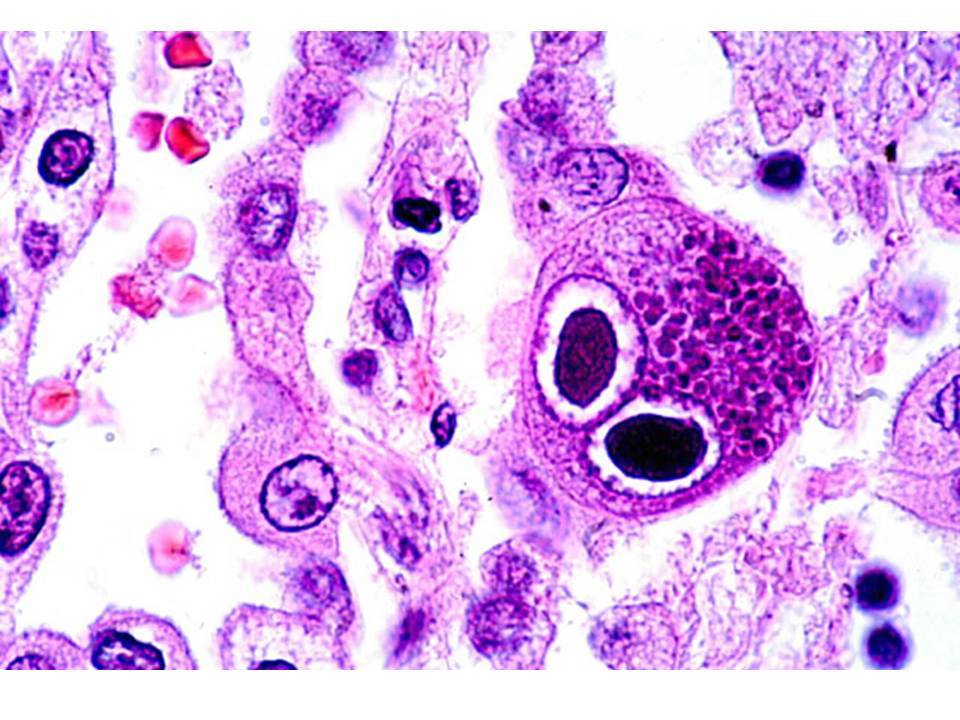
What is cytomegalovirus? Its causes, symptoms and treatment. Cytomegalovirus during pregnancy: tests, forecasts and treatment.
The content of the article
- Causes and symptoms of cytomegalovirus
- Symptoms of cytomegalovirus during pregnancy
- Antibodies to cytomegalovirus - what does this mean?
- Analysis for cytomegalovirus during pregnancy
- Deciphering the analysis for cytomegalovirus in pregnant women. Indicators of cytomegalovirus during pregnancy, norm. What do the titers of cytomegalovirus mean during pregnancy?
- Treatment of cytomegalovirus
- How to treat cytomegalovirus during pregnancy?
- Cytomegalovirus during pregnancy: consequences for the fetus
- Cytomegalovirus when planning pregnancy
- What is a ractation of cytomegalovirus during pregnancy?
- What to do if cytomegalovirus was found during pregnancy: tips and reviews
- Video: symptoms and treatment of cytomegalovirus
Cytomegalovirus infection (cytomegaly) is a viral disease provoked by an infection of the body with a cytomegalovirus.
Causes and symptoms of cytomegalovirus

Causes of cytomegalovirus
- The main cause of such a disease is the penetration of a virus called cytomegalovirus into the human body. Such a disease is not particularly dangerous for people with a normal immune system. Sometimes it proceeds completely asymptomatic and is suppressed by its own forces. It is worth noting that having once been into the human body, cytomegalovirus remains there forever
- The latent period of cytomegaly is about two months. During this time, signs of ordinary colds can be the only manifestation of the disease. The only difference between cytomegalovirus infection from a cold is the duration of symptoms. If SARS or ARI, as a rule, pass in a week or two, then cytomegalovirus manifestations can be preserved for a month or two
- Cytomegalovirus is contained in various kinds of liquid discharge of a person: urine, blood, seed fluid, discharge in the vagina and tears. Hence the methods of infection with this virus follow: domestic, sexual, hemotransfusion (blood transplant, organs transplant), airborne and transplacental routes

Symptoms of cytomegalovirus
The following manifestations can be symptoms of the disease:
- runny nose
- fever and chills
- headache
- improving body temperature
- lymphadenopathy (increase in lymph nodes)
- rashes on the skin
- pain and inflammation in the joints
Symptoms of cytomegalovirus during pregnancy

Symptoms of cytomegalovirus in pregnant women
If a woman is infected during pregnancy with a cytomegalovirus, she can be expected by the same manifestations of the disease as in a healthy person:
- swelling of the nasal sinuses
- elevated temperature
- weakness
- fast fatiguability
- headache
- lymphadenopathy
- abundant salivation

Manifestations of cytomegalovirus during pregnancy
With any immunodeficiency and diseases associated with the weakening of the immune system, cytomegalovirus can give complications and provoke a number of the following diseases and complications:
- pneumonia
- arthritis
- pleurisy
- inflammation of the urine system
- encephalitis
- myocarditis
- gastrointestinal diseases
- paralysis
- lung defeat
- visual impairment and various kinds of eye diseases
However, all of the listed complications are extremely rare, and they are more characteristic of people with very weak immunity (HIV-vich, patients with diabetes or women after organs transplant). In most cases, a cytomegalovirus infection may not show herself at all, and a woman becomes known about the disease only after the delivery of mandatory tests.
Antibodies to cytomegalovirus - what does this mean?
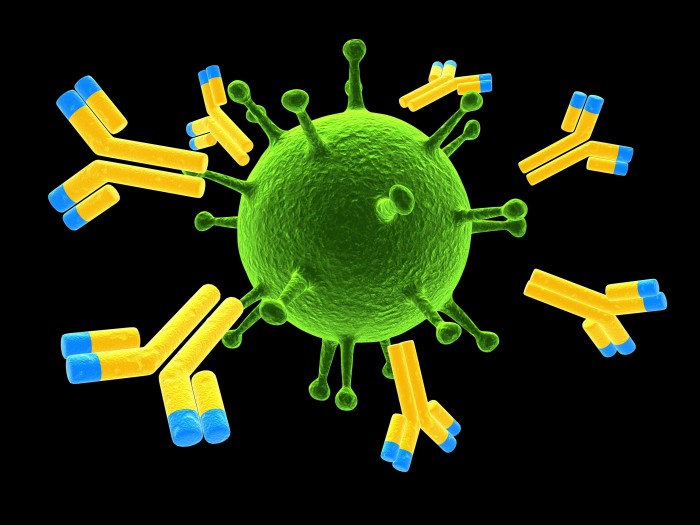
Antibodies to cytomegalovirus
- Once in the human body, cytomegalovirus provokes the immune system to produce special antibodies. Such antibodies or immunoglobulins are designed to fight and destroy this virus
- Immunoglobulins are protein cells containing a code of a particular virus against which they are produced
- Antibodies to cytomegalovirus begin to be produced a week after the infection enters the body and remain in it for many years. That is, if after a few years a person will again have to encounter a cytomegalovirus infection, immunoglobulins developed during the first infection neutralize and eliminate the virus that has entered the body with new contact
Analysis for cytomegalovirus during pregnancy
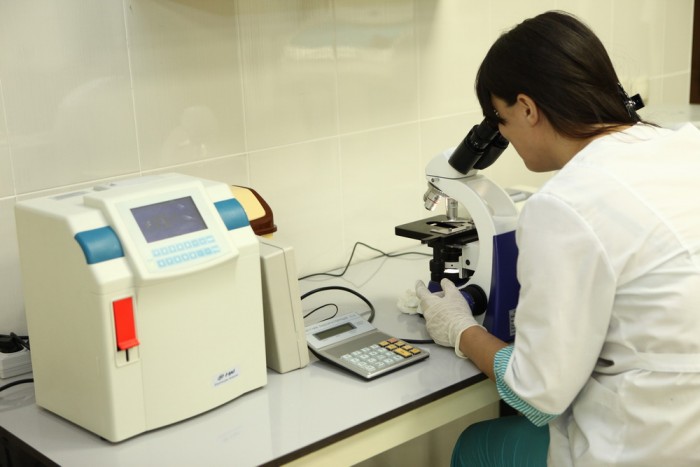
Tests for cytomegalovirus during pregnancy
To diagnose cytomegalovirus in the body of a pregnant woman, several types of tests can be used:
- cytological
- molecular biological
- serological
- virusological

Types of tests for cytomegaloviruses
- The first type of analysis is based on cytological studies of urine or saliva of a pregnant woman. When considering the secretion products of the female body under a microscope, cytomegalovirus can be detected by the presence of a huge size of cells
- The molecular biological analysis is carried out using PCR (polymerase chain reaction). Such a reaction can recognize the DNA of cytomegalovirus in the blood, urine, saliva, smear or sputum of a person
- Virusological analysis refers to the most expensive analyzes. In the course of its conduct, the virus is cultivated in its nutrient medium
- Cytology and PCR are not as expensive as virology, however, during pregnancy, the clinical picture can be lubricated with various kinds of changes and processes in the female body. Therefore, most often to identify cytomegalovirus, a serological method of research is used
- The material for serological research is venous blood. It is in it that you can find traces of cytomegalovirus and antibodies to it. Serological analysis for cytomegalovirus infection is called analysis of torch infection. The fact is that during it, several types of viruses and infections (rubella, toxoplasmosis, herpes, etc.) can be detected in the blood.
Deciphering the analysis for cytomegalovirus in pregnant women. Indicators of cytomegalovirus during pregnancy, norm. What do the titers of cytomegalovirus mean during pregnancy?

Decoding analysis on cytomegalovirus
During the serological examination of the blood of a pregnant woman, two types of IgG and IgM immunoglobulins will be present for the presence of cytomegalovirus in the decryption table. The first type of antibodies indicates the presence of the female body of immunity to the virus. The second type of immunoglobulin may indicate the development of infection.
Here is an accurate decoding of the analysis for cytomegalovirus in pregnant women:
- If, according to the results of the analysis, neither IgG nor IGM antibodies were found in the blood, this means that a woman has never contacted the virus, and there are no immunoglobulins in her body that can fight it. Such women need to be more careful not to become infected with cytomegalovirus during pregnancy
- If, during the analysis in the blood of the future mother, IgG antibodies were detected, and IGM immunoglobulins are absent, then this suggests that the woman had contact with the virus, but her body has overcome it, and henceforth he was armed against him
- If the tests showed an increased IGM titer and the absence of IGG titer, then at the moment there is an acute infection in the woman’s body. In other words, the future mommy was infected either before pregnancy, or during it. The determination of the time of infection will depend on what terms the tests were given
- High titers of IgM and IgG indicate reactivation of cytomeagalovirus
- Low IGM and IgG titers indicate that there is an infection, but it is in a state of attenuation
Treatment of cytomegalovirus

Treatment of cytomegalovirus
- It is not necessary to treat cytomegalovirus with normal immunity. The fact is that strong immunity over time itself couches the virus and suppress its activity
- But people with a weakened immune system treatment of cytomegalovirus are extremely necessary. For such a category of patients, a set of measures is being carried out that pursue two goals - the destruction of the virus and strengthen the immunity
- To cope with the cytomegalovirus, patients may be prescribed a course of antiviral drugs (for example, Panavir, Gancyclovir, Valganciclovir or Foxarnnet). The intake of the listed drugs should be prescribed only by a doctor and carried out under his strict control. This is due to the strong toxicity of the drugs and their ability to specifically harm the human body

Treatment of cytomegalovirus by immunoglobulins
Sometimes patients with cytomegaly are prescribed treatment with immunoglobulins. Such treatment is an intravenous introduction of antibodies to human blood to the virus. Carrying out such manipulations is carried out only in a hospital, since such a procedure should be carried out according to a clearly approved schedule. The use of immunoglobulins in the fight against cytomegalovirus is contraindicated in the following categories of people:
- patients with diabetes
- prone to allergies, people
- patients with kidney diseases
- pregnant and nursing mothers
- people who were instilled on the eve or parallel from other viruses
How to treat cytomegalovirus during pregnancy?

How to treat cytomegalovirus during pregnancy?
- Unfortunately, a remedy has not yet been invented or openly invented that could kill and eradicate cytomegalovirus in the human body. Therefore, by and large, a specific medicine does not exist
- Treatment of cytomegalovirus in a pregnant woman, as a rule, is aimed at maintaining and strengthening her immune system. To do this, the doctor may prescribe her intake of vitamin complexes and immunomodulating drugs (Teactivin, Reaferon, etc.)
- If the disease proceeds in more acute and complex forms, then a decision can be made on the course of antiviral and antibacterial drugs
- In very rare cases, doctors resort to the use of immunoglobulin droppers (for example, cytotex)
Cytomegalovirus during pregnancy: consequences for the fetus

The consequences of cytomegalovirus for the fetus
If the woman first contacted the cytomegalovirus during pregnancy, then this may have a number of dangerous consequences for the fetus. Firstly, infection in the early stages (in the first trimester) can lead to miscarriage or frozen pregnancy. Secondly, it is able to affect the development of the fetus intrauterine and after his birth.
In some cases, crumbs infected in the womb can be born with a number of various kinds of anomalies and pathologies:
- microencifalia
- hydrocephalus
- liver and spleen diseases
- various deformities
- the underdevelopment of the brain
- heart disease
- Cerebral palsy
- epilepsy
- deafness
- muscle weakness
- red rashes on the skin

What is the danger of cytomegalovirus during pregnancy?
Sometimes the manifestations of the disease become obvious after the baby reaches two to five years of age. Such manifestations can be:
- hearing loss
- loss of vision
- speech problems
- mental retardation
- mental development problems
There are times when the baby is born absolutely healthy, and over the years the state of his health, both physical and psychological, remains stable.
If the infection of the crumbs occurs through breast milk, then his body copes with the virus in the same way as the body of an adult.
Cytomegalovirus when planning pregnancy

Cytomegalovirus when planning pregnancy
- When planning pregnancy, it is advisable for a woman to take an analysis for torch infection. This will help clarify the picture regarding its infection with cytomegalovirus in the past and the presence of immunity to it in the present
- Analysis for torch infection is not mandatory in preparing for pregnancy, and no one can force a woman to take it. However, its results will be extremely useful in order to adjust further manipulations and behavior of the future mommy during pregnancy
- If a woman is not detected before the pregnancy of IGG immunoglobulins, then she should be very careful. After all, the infection awaits the future mother at every step, and her immunity is not ready to meet her. This can lead to rather complex and deplorable consequences
- If the ladies are present in the blood, then she can calm down a little. However, no one canceled a healthy lifestyle and instructions of a doctor in this case. After all, the virus sleeping in her body can start his reactionation at any time
What is a ractation of cytomegalovirus during pregnancy?
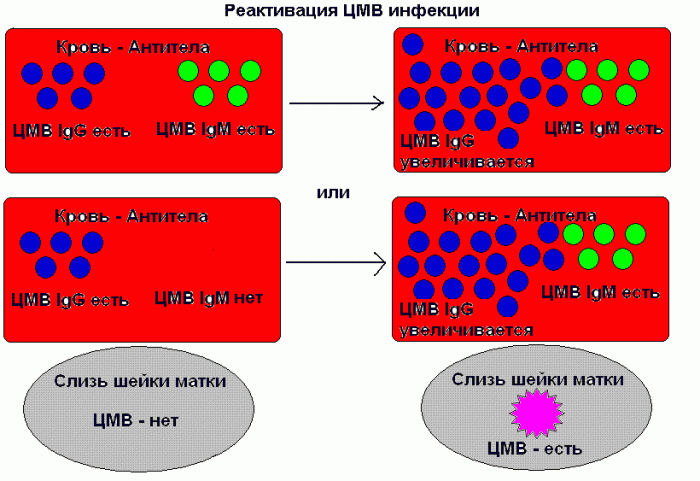
Reactivation of cytomegalovirus
- Sometimes it happens that during pregnancy, which has long sitting in the female body, cytomegalovirus manifests its activity. As a rule, such a phenomenon is observed against the background of weakening immunity due to pregnancy itself. Such an activity of the virus reactivation is called
- The probability of infection of the fetus during reactionation is no more than two percent
- However, the risks still remain. Therefore, often, to combat the cytomegalovirus, a pregnant woman is prescribed a course of immunomotive drugs
- During reactivation, the doctor can prescribe droppers of the immunoglobulins of cytomegalovirus
What to do if cytomegalovirus was found during pregnancy: tips and reviews

What to do if cytomegalovirus was found during pregnancy?
If during pregnancy the woman diagnosed infection with cytomegalovirus, then most likely she will be prescribed the following additional tests to identify the effect of the virus on the development of the fetus:
- Ultrasound. In the course of this study, the doctor will determine whether any anomalies are present in the development of the fetus. If such are identified, then most likely a woman will advise to interrupt such a pregnancy
- Amniocentesis (analysis of amniotic fluid). Such an analysis will find out whether the infection has reached the placenta and fetus. If the virus is found inside the placenta, it will be necessary to check its concentration or viral load. The lower the number of viruses in amniotic fluid, the less serious consequences can expect the baby in the future
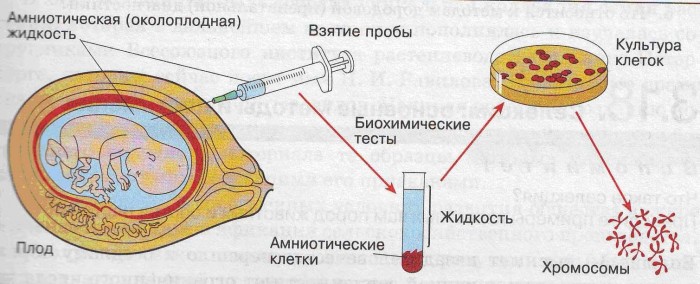
Studies of amniotic fluid with cytomegalovirus
- If all the fetal indicators are normal, then there is nothing to fear. However, after a certain period of time, an amniocentesis will have to be repeated in order to make sure that the infection has not yet struck the embryo
- Woman C revealed during pregnancy, cytomegalovirus is prescribed corresponding treatment: taking immunostimulants, drugs with immunoglobulins or antiviral drugs
- In such a difficult moment for a pregnant woman and her baby, a woman will need to relax as much as possible, visit the fresh air and eat right. That is, she needs to support and strengthen her immune system on her own as much as possible, because the course of the disease and its outcome will depend on it
